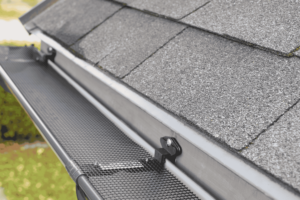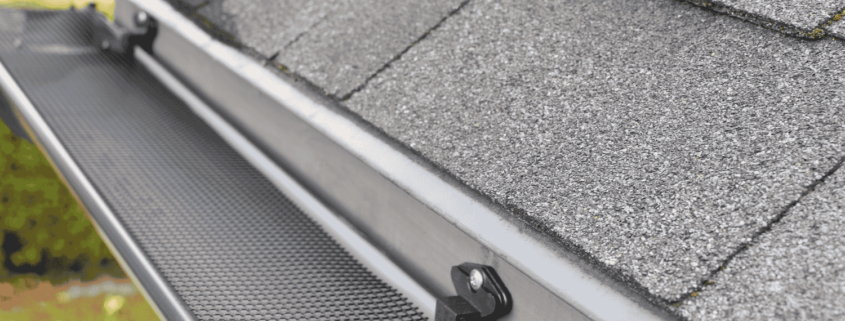Covered Gutters vs Open Gutters
There are a lot of choices to make when it comes to maintaining your home. One of the decisions you may be facing is whether to install covered gutters or open gutters. Both have their pros and cons, so it’s important to weigh your options before making a decision.

Open gutters are less expensive to install, and they’re easier to clean. However, they’re also more susceptible to clogging from leaves and other debris. Covered gutters are more expensive upfront, but they can save you money in the long run because they’re less likely to need repairs. They’re also better at keeping out debris, so you won’t have to worry about clogs as much.
Ultimately, the best type of gutter for your home depends on your budget and your needs. If you live in an area with a lot of trees, covered gutters may be the way to go. But if you’re on a tight budget, open gutters may be the better option. Talk to a professional to get their opinion on which type of gutter would be best for your home.
Gutter Guards
Gutters are an essential part of any home, channeling water away from your roof and foundation to protect your home from water damage. However, gutters can also be a serious pain to clean, especially if you have a lot of trees on your property. Leaves and twigs can quickly clog up a gutter, causing it to overflow and potentially damaging your home. Gutter guards are an easy way to keep your gutters clean and prevent water damage. They fit snugly over your gutters, blocking leaves and debris while allowing water to flow freely through. As a result, you’ll never have to worry about cleaning your gutters again – and you’ll rest easy knowing that your home is protected from water damage.
Covered Gutters
Covered gutters are a type of gutter that is installed on the roof of a home or other structure. They are designed to prevent leaves and other debris from clogging the gutter, which can cause serious damage to the roof. Covered gutters are usually made of metal or plastic, and they can be either permanent or removable. Permanently covered gutters are installed by a professional, while removable covers can be installed by the homeowner. While covered gutters can be more expensive than traditional gutters, they offer many benefits, including protection from fire and insect damage. Moreover, covered gutters can help to extend the life of a roof by preventing leaves and other debris from clogging the gutter. In short, covered gutters offer many benefits and should be considered when choosing a gutter system for your home or business.
Do Covered Gutters Really Work?
Anybody who has had to clean out a gutter knows that it can be clogged with leaves, sticks, and all sorts of other debris. This can cause all sorts of problems, including water damage to your home’s foundation or landscaping. As a result, many homeowners opt to install covered gutters. But do they really work?
Covered gutters are designed to keep debris from entering the gutter in the first place. The most common type of cover is a mesh screen that covers the entire opening of the gutter. Some homeowners also choose to install a solid cover that sits on top of the gutter. While these covers can be effective at keeping out larger debris, they can also prevent much-needed rainwater from entering the gutter. As a result, it’s important to clean your gutters on a regular basis, even if you have a cover installed.
In short, covered gutters can help to reduce the amount of debris that enters your gutters. However, they will not completely eliminate the need for regular cleaning and maintenance.
Open Gutters
An open gutter is a type of drainage system that is commonly used in residential properties. It consists of a series of pipes that are installed along the roofline of the home and connected to the downspouts. The gutters collect rainwater from the roof and channel it away from the foundation, helping to prevent water damage. Open gutters are available in a variety of materials, including plastic, aluminum, and copper. While they are relatively easy to install and maintain, open gutters can be susceptible to clogging if they are not cleaned on a regular basis. For this reason, many homeowners opt for a closed gutter system, which has a series of small holes that allow water to drain while preventing debris from entering.
Advantages of Open Gutters
Many people believe that open gutters are a disadvantage because they can be difficult to keep clean. However, there are actually several advantages to having open gutters. First, they allow rainwater to flow freely off the roof, which can help to prevent water damage. Second, they provide an easy way for leaves and other debris to fall off the roof, preventing them from clogging the gutters. Finally, open gutters can help to improve the appearance of your home by providing a neat and tidy look. As you can see, there are actually several benefits to having open gutters. If you are considering installing gutters on your home, be sure to weigh the pros and cons carefully before making a decision.
Types of Gutters
The most common type of gutter is the “U” shaped gutter, which is installed along the edge of the roof and directed into downspouts that carry the water away from the foundation. “K” style gutters are another popular option, and they are often used on homes with steep roofs or large overhangs. These gutters have a more decorative look than traditional “U” shaped gutters, and they are available in a variety of colors to match the trim on your home. If you live in an area with a lot of trees, you may need to install a leaf guard system to keep your gutters from becoming clogged with debris. No matter what type of gutter system you choose, it’s important to have it professionally installed to ensure that it functions properly.
Best Gutter System for a House
The best gutter system for a house is one that suits the specific needs of that house. There are many different types of gutters available on the market, so it is important to consider the environment in which the house is located, the amount of rainfall the area typically receives, and the height of the eaves. Once these factors have been taken into consideration, it is possible to choose a gutter system that will be effective in keeping the house safe from water damage. In general, it is best to choose a system that has been designed specifically for houses in your area, as this will help to ensure that it can withstand the local weather conditions.



